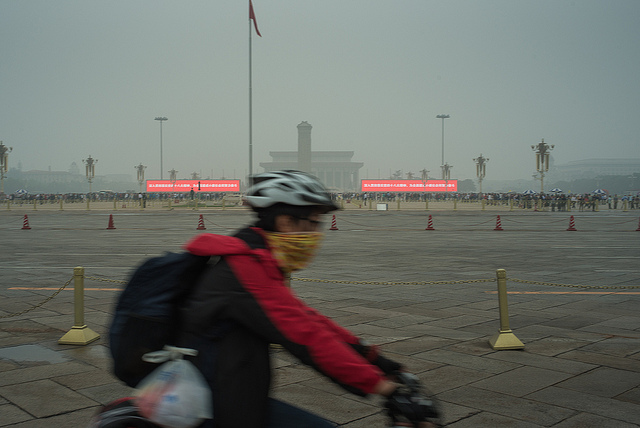Outdoor air pollution in China is so severe that many people wear face masks to filter out airborne particles that pose a serious health threat, and visitors often develop a “Beijing cough,” a dryness and itchiness in the throat.
In fact, China is one of the world’s deadliest countries for outdoor air pollution, according to an analysis by the World Health Organization (WHO). Almost half of the Chinese population is exposed to fine particulate matter (PM2.5), a major constituent of smog, at a level beyond the highest hazard threshold in the United States. WHO calculated that as recently as 2012, more than 1 million people were dying from dirty air in China each year.
People in China are worried about their health and are looking for solutions. Xin Zhang of the National School of Development at Peking University, Xiaobo Zhang of Peking University and IFPRI, and Xi Chen of the Department of Health Policy and Management at Yale studied the scope of the problem and found that many people are willing to pay a portion of their salary to improve quality air. Their findings were published recently in the journal Ecological Economics.
Taking an innovative “happiness approach,” the authors used a nationally representative survey to match self-reported levels of happiness with daily air quality data. This allowed them to estimate the relationship between local concentrations of particulate matter and individual happiness. Using these parameters, they calculated the monetary value of cutting PM2.5 and also found that its concentration has a significant negative effect on people’s happiness.
Families with children are willing to spend a significant amount of their income for better air quality, the study showed. Specifically, parents with children under six are willing to invest 5.9 percent of their annual income ($120) for a reduction in PM2.5. Families without children under six, meanwhile, were willing to spend 3.3 percent of their annual income, or $70. The study also provides estimates of willingness to pay for other pollutants and for other key demographic groups.
These results have important policy implications. China’s 13th Five-Year Plan (running from 2016 to 2020) aims for progress in reducing air pollution. Optimal environmental regulations depend on the tradeoffs between benefits and costs. The study supports the idea that tightening environmental regulations, despite economic costs, would have substantive benefits in overall well-being. Therefore, the study’s valuations can be used to judge how tight environmental regulations could be to achieve a positive return to Chinese residents.
The choking smog in recent years has galvanized public opinion in China, driving up support for more stringent environment regulations. China’s environmental health crisis is testing the resilience of the state. According to a new report released by the U.S. Council on Foreign Relations, “If the government fails to address the crisis effectively, as indicated by the exacerbating environmental health problems, the expanding gap between economic and social development—combined with growing social frustration over a worsening environment—could devolve into a bigger crisis.”
Many countries, especially those undergoing rapid economic development, face similar problems. According to a WHO air quality report released in 2016, 92 percent of the world’s population lives in places where air quality levels exceed WHO limits, and this problem is more severe in less developed countries., Quantifying the relationship between pollution levels, citizen happiness, and economic costs can be a valuable tool for devising solutions.
Jennifer Kaylin is a communications consultant at the Yale School of Public Health; Xi Chen is an assistant professor at Yale University and the corresponding author of this study.







